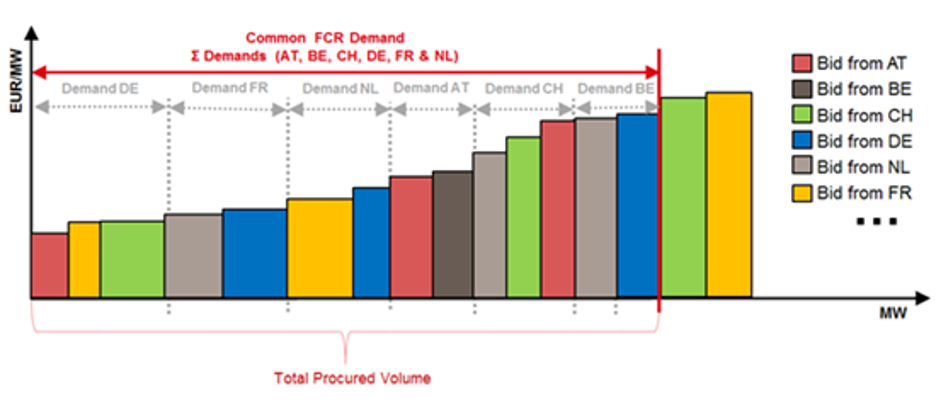Cross-zonal cooperation
Frequency Containment Reserve (FCR)
Ever since mid-2013, APG has been procuring the FCR it requires jointly with Swiss transmission system operator Swissgrid on the basis of a TSO-TSO model. This successful cooperation was extended to include the TSOs from Germany and the Netherlands in April 2015. In July 2016, the Belgian TSO and, in January 2017, the French TSO also joined the existing cooperation. West Danish TSO Energinet and Slovenian TSO ELES became involved in the joint procurement of FCR in January 2021.
The cooperation is based on the principle of equal rights and obligations. In addition, the market models in connection with the application pursuant to Article 33 of Regulation (EU) No 2195/2017 (Electricity Balancing Guideline) have been largely harmonised.
As part of this cooperation, all bids received by the relevant TSOs are compiled and awarded to the combination of parties with the most advantageous offer in terms of the overall costs of the joint procurement. The marginal prices (for each country) are calculated using the marginal price principle for settlement. As a rule, a common marginal price is determined that is applicable to all countries. The exception to this is when a country is subject to an import or export limit (import and export limits are set based on the criteria of the System Operations Guideline (SOGL) and limit the exchange of FCR). A local marginal price is then determined for this country, with the marginal price being determined in each case on the basis of the local bids. The marginal prices are relevant both for settlement with the providers and for TSO-TSO settlement. Exporting TSOs receive the marginal price that is applicable for their market area, while importing TSOs pay the applicable marginal price for their market area. As described above, this is normally the same. If import or export limits become applicable, an “annuity” is incurred that is divided between all cooperation partners in proportion to their import or export volumes.
Technical description
All participating TSOs procure the FCR they require in individual, market-based tenders that take place on a daily basis, in which providers can participate following a successful technical and organisational review (prequalification). However, after conclusion of the national tenders (gate closure), which happens at the same time, the bids are not awarded directly, but are first transmitted to a central clearing system (CCS). This system calculates the optimal combination of FCR bids to be awarded under consideration of national core shares – i.e. the shares of reserves required to be held within the control area – and the maximum exchangeable FCR volumes. The participating TSOs are then notified by the CCS of which bids have been successful in the relevant national tenders.
The results submitted by the CCS are rechecked in the national tendering systems and the outcome is deemed valid after the results have been accepted in the relevant national system.

If an exchange of bids is not possible (due for example to technical issues), the tenders must be decoupled and bids will be awarded at a national level.
If the total FCR demand of the cooperation cannot be covered by the total FCR volume of bids, all local bids will initially remain in the country of the connecting TSO. If local surplus exists in some of the countries, it will be pooled and distributed among the TSOs in deficit. Any remaining shortfalls have to be procured locally by the TSOs concerned. France has a special position here. If the volume offered is not sufficient to cover French demand, France decouples from the cooperation and optimisation is carried out again for the rest of the cooperation in line with the procedure described above.
Legal environment
The legal conditions for the cooperation are regulated in a framework agreement or cooperation agreement between the participating TSOs and have no impact on the providers, as the existing contracts remain in place unchanged. Even new providers only have to go through a prequalification process with their connecting TSO and conclude a framework agreement.
In the case of settlement between the providers, only the connecting TSO is the provider’s contractual partner, even if they hold FCR for other control areas. Under the TSO-TSO model, the TSOs pay for the holding of the cross-zonal reserve.
Publication
Following conclusion of the tender, the Austrian results will be published in the customary manner on APG’s tendering platform at https://rrap.apg.at/ as well as on the EMFIP transparency platform in accordance with the Transparency Regulation (Regulation (EU) No 543/2013).
Benefit
The primary control cooperation based on a TSO-TSO model opens up a larger supply market to all Austrian providers for primary control without necessitating further prequalification (2021: ±1,444 MW). In addition, the Austrian market and the overall system will benefit from cost savings due to the market’s increased liquidity.
Balancing
Information about the stability of the grid frequency, the control reserve market and essential basics of grid control.
Frequency containment reserve - FCR
Tenders for the primary control reserve in the APG control area and frequently asked questions about primary control.

